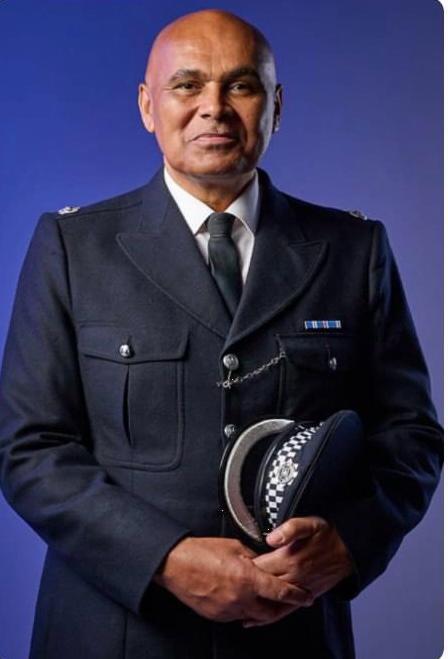Social Justice
Paul Wilson's Impact on British Policing
“Join us on a journey through history with Paul Wilson, a trailblazer in British policing. From establishing the UK's first Black Police Association to his pivotal role in the Stephen Lawrence Inquiry, Wilson's story is one of resilience and reform.”
Black Wall St. MediaContributor


In the annals of British policing, Paul Wilson’s name stands as a testament to both resilience and reform.
After an illustrious 31-year career with the London Metropolitan Police, culminating in his role as a superintendent, Wilson emerged not just as a seasoned law enforcement professional but as a trailblazer in the fight against racism within the force.
Wilson’s journey takes us back to a pivotal moment in the late 1980s when he played a crucial role in establishing the UK’s first Black Police Association.
Fueled by a commitment to rectify the systemic issues affecting black and minority ethnic (BME) communities, Wilson spearheaded numerous reports addressing institutional racism within the police service.
His influence reached its zenith during the Stephen Lawrence Inquiry, where he, as the first black British recipient of the Fulbright police fellowship award, authored a seminal report and delivered powerful oral testimony.
The inquiry marked a watershed moment, exposing the deep-seated challenges of racism within the police force and catalyzing a call for reform.
Wilson’s authority on the subject stems not only from his professional achievements but from the authenticity of his lived experiences.
His career was marked by unwavering dedication to addressing racial disparities in policing, fostering open dialogue, and promoting accountability.
In the decades since, despite Wilson’s tireless efforts and those of other advocates, progress against racism in British policing has been slow. Wilson, now retired, reflects on the proliferation of racism within the force and the incremental pace of change.
He recounts the challenges faced, from navigating institutional resistance to confronting embedded biases.
Wilson’s personal narrative serves as a poignant reminder of the complexities involved in dismantling long-standing structures of discrimination.
As the fight against racism in British policing persists, Paul Wilson’s experiences provide invaluable insights. His journey reflects not only the strides made but also the formidable obstacles that demand sustained effort.
Wilson stands as a beacon, urging a continued commitment to reform and justice within the heart of law enforcement.

Rocking the Boat: A Pioneering Journey Against Institutional Racism in Policing”
This compelling book delves into the harrowing realities of contemporary policing, shedding light on critical racist events with meticulous detail.
Penned by a courageous influencer and leader who played a pivotal role at the forefront of transformative shifts in police culture, it offers a thoughtful and at times, a uniquely global perspective.
Endorsed by John G.D. Grieve CBE QPM BA Hons MPhil Hon DL as a valuable addition to any library, this book stands as an essential read and a potential case study for policing and police leadership courses. The narrative, both personal and organizational, unfolds over three decades, providing a thought-provoking exploration of the policing of color both within and outside the Metropolitan Police.
Simon Israel acknowledges the author’s profound insights into the challenges faced by a black police officer, from enduring racist insults to confronting pervasive prejudice, ultimately becoming the Met Police’s first-ever black superintendent in Brixton. In light of recent events surrounding Black Lives Matter and ongoing controversies over stop and search, Paul Wilson’s analysis proves prescient and underlines his unyielding commitment to racial justice.
Trevor Hall CBE, retired Race Equality Advisor to the Home Office, commends the author’s courage in sharing his experiences, emphasizing the book’s relevance to current discussions on police and race relations.
Patricia F Gallan QPM, retired Assistant Commissioner, Metropolitan Police, highlights the historical significance of the book, acknowledging that it addresses lingering racial issues within New Scotland Yard.
Lord Brian Paddick, former Deputy Assistant Commissioner, Metropolitan Police, underscores the far-reaching impact of Paul Wilson’s career, from establishing the Black Police Association to influencing the Stephen Lawrence Inquiry and engaging with influential figures globally.
“Rocking the Boat” not only chronicles a fascinating career but serves as a wake-up call in the Black Lives Matter era. It paints a vivid picture of a black police officer’s extraordinary determination to challenge a police occupational culture steeped in racism.
Beyond its educational value, the book intertwines entertaining anecdotes, making it a pleasurable yet impactful read.
Paul Wilson’s experiences and insights resonate not only as a historical account but as a testament to resilience and the ongoing struggle for justice within law enforcement.
Black Wall St. MediaContributor







